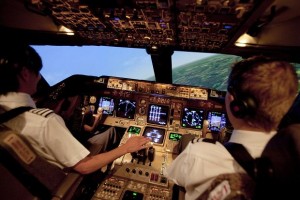
The major tragedy is that these crashes, related to LOC-I, could have been mitigated if pilots were trained to safely and effectively deal with recoverable in-flight upsets.
While most pilots are unaware of this data, this information on its own often is not enough to prevent pilots from acting. However, as so often there is a major gap between knowing that an Upset Prevention and Recovery Training could defend you against LOC-I and actually attending this training. Although most pilots of every skill level are aware (or at least should be aware) of the fact that LOC-I is a seriously dangerous situation, the most of them are still unequipped to safely and effectively deal with any recoverable in-flight upset. One of the reasons seems to be that it is a matter that reminds us of a dangerous situation, which we by nature as a human being want to avoid under all circumstances. Instead of facing possible dangerous situations like LOC-I, our behavior often is accompanied by denial. Research seems to show that we are tending to believe that we ourselves aren’t running the risk.
One of the most difficult things in human nature is facing the existence of tragic realities like deadly accidents. Even when it happens to others that we don’t know, such accidents can distress us because we are aware that it also can happen to us. These uncomfortable dangerous thoughts are difficult to accept for us so we do our utmost best to deny that we are running the same risk. One of the ways we create these denying thoughts, is to make ourselves defense attributions; statements that protect us from feelings of danger and mortality.
Conclusion; our thought is a section of the result of a powerful thinking process. It has a major influence on our effectiveness. There are moments that we use our thoughts efficiently. However when it comes to a matter that reminds us of dangerous situations, our thoughts can be the reason to oppose against acting effectively such as arming ourselves to prevent or deal with those dangerous situations.
Many pilots are unaware that with just a few hours of dedicated all-attitude upset prevention and recovery training, pilots of every skill-level can be prepared to effectively and efficiently deal with any recoverable in-flight upset.
Aviation Performance Solutions (APS) has decades of experience instructing Upset Prevention and Recovery Techniques. We continue to find it is the total absence of training involving flight in the upset domain which fosters an inability of pilots to effectively counter an unexpected upset event.
The facts are clear, LOC-I is the primary cause of fatalities that pilots face. Reduce the threat through the all-attitude Upset Prevention and Recovery Training provided by APS.
Comments: